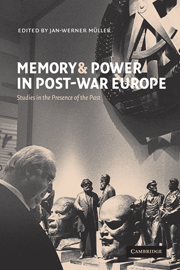Book contents
- Frontmatter
- Contents
- List of contributors
- Acknowledgements
- Introduction: the power of memory, the memory of power and the power over memory
- Part 1 Myth, memory and analogy in foreign policy
- Part 2 Memory and power in domestic affairs
- 7 The past is another country: myth and memory in post-war Europe
- 8 The emergence and legacies of divided memory: Germany and the Holocaust after 1945
- 9 Unimagined communities: the power of memory and the conflict in the former Yugoslavia
- 10 Translating memories of war and co-belligerency into politics: the Italian post-war experience
- 11 Institutionalising the past: shifting memories of nationhood in German education and immigration legislation
- 12 Trials, purges and history lessons: treating a difficult past in post-communist Europe
- Index
9 - Unimagined communities: the power of memory and the conflict in the former Yugoslavia
Published online by Cambridge University Press: 22 September 2009
- Frontmatter
- Contents
- List of contributors
- Acknowledgements
- Introduction: the power of memory, the memory of power and the power over memory
- Part 1 Myth, memory and analogy in foreign policy
- Part 2 Memory and power in domestic affairs
- 7 The past is another country: myth and memory in post-war Europe
- 8 The emergence and legacies of divided memory: Germany and the Holocaust after 1945
- 9 Unimagined communities: the power of memory and the conflict in the former Yugoslavia
- 10 Translating memories of war and co-belligerency into politics: the Italian post-war experience
- 11 Institutionalising the past: shifting memories of nationhood in German education and immigration legislation
- 12 Trials, purges and history lessons: treating a difficult past in post-communist Europe
- Index
Summary
There is a power to the words ‘I remember’: the power of an event long past, exerting itself upon the present, the power of an individual over a collective, the power of opinion over fact. It is not one that can simply be included in academic theory or quantified by statistics, nor can it easily be discredited as untrue. Often enough, ‘I remember’ is not an exchange – it is an authoritative statement, based on the stark power of personal conviction, seemingly resistant to contestation by others. When the words begin a flow of warmth or love, it is a positive, binding power, but it is the most divisive and negative one possible when they lead on to events of death and destruction, allocating blame and defining justice in terms of personal and national memories. For as the dark recollections swirl around, enforced by the personal pain of the speaker, the statements join together into a weapon of hate and fear.
In the former Yugoslavia, it was this divisive, negative power which underlay the collapse into the wars. From nationalist leaders to village paupers, as of the mid-1980s memories seemingly poured out in an incessant stream: some personal, others personalised, some no more than a myth, others specific recollections – but all reflecting on pain and past ills.
- Type
- Chapter
- Information
- Memory and Power in Post-War EuropeStudies in the Presence of the Past, pp. 206 - 222Publisher: Cambridge University PressPrint publication year: 2002
- 19
- Cited by



